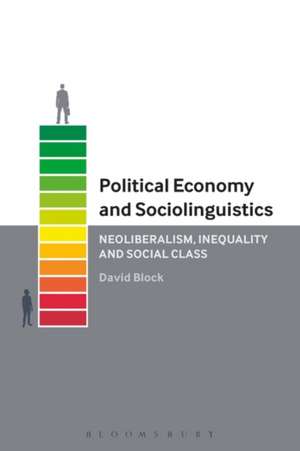Political Economy and Sociolinguistics: Neoliberalism, Inequality and Social Class
Autor David Blocken Limba Engleză Paperback – 7 feb 2018
| Toate formatele și edițiile | Preț | Express |
|---|---|---|
| Paperback (1) | 199.73 lei 3-5 săpt. | |
| Bloomsbury Publishing – 7 feb 2018 | 199.73 lei 3-5 săpt. | |
| Hardback (1) | 598.52 lei 6-8 săpt. | |
| Bloomsbury Publishing – 7 feb 2018 | 598.52 lei 6-8 săpt. |
Preț: 199.73 lei
Preț vechi: 231.34 lei
-14% Nou
Puncte Express: 300
Preț estimativ în valută:
38.23€ • 41.54$ • 32.13£
38.23€ • 41.54$ • 32.13£
Carte disponibilă
Livrare economică 31 martie-14 aprilie
Preluare comenzi: 021 569.72.76
Specificații
ISBN-13: 9781474281447
ISBN-10: 1474281443
Pagini: 248
Dimensiuni: 156 x 234 x 25 mm
Greutate: 0.44 kg
Editura: Bloomsbury Publishing
Colecția Bloomsbury Academic
Locul publicării:London, United Kingdom
ISBN-10: 1474281443
Pagini: 248
Dimensiuni: 156 x 234 x 25 mm
Greutate: 0.44 kg
Editura: Bloomsbury Publishing
Colecția Bloomsbury Academic
Locul publicării:London, United Kingdom
Caracteristici
Takes on the rather loose appropriations of political economy concepts and terms in contemporary sociolinguistics, such as 'capital', 'ideology', 'marketization', 'commodification' and 'neoliberalism', subjecting them to the kind of critique which has hitherto been missing
Notă biografică
David Block is ICREA Research Professor in Sociolinguistics at the University of Lleida, Spain. His main interests are the impact of political economic, sociological, anthropological and geographical phenomena on multimodal practices of all kinds, including social movements, multiculturalism, bi/multilingualism and the acquisition and use of languages.
Cuprins
Preface1. A short history of political economy in sociolinguistics2. Political economy: Background and approach3. Neoliberalism: Historical and conceptual considerations4. Stratification, inequality and social class5. The neoliberal citizen: conceptualisations and contexts6. Inequality, class and class warfare: Discourse, ideology and 'truth' Epilogue References Index
Recenzii
Political Economy and Sociolinguistics: Neoliberalism, Inequality and Social Class is written in Block's readable style and is suitable for graduate student level research and above. Through the initial three theoretical chapters which dissect the principle concepts of the book, Block succeeds in providing a strong foundation for the analyses that follow. The accessible case studies and succinct discussions will be of use to educators wishing to demonstrate to students of all levels the prevalence and depth of the discursive construction of neoliberalism, inequality, and 'classtalk' in 'western' societies. It will also be of interest to linguists hoping to integrate political economy in their research, particularly those seeking a history and a firm theoretical foundation in the area. This book is particularly necessary at this juncture in time, when market rule appears absolute, and with the rise of far-right parties and groups across Europe and North America ... The book calls for increased collaboration between linguists interested in political economy and economists of language, bridging the ontological and epistemological differences in each field.
This represents an important project which could both fill a gap and chime with the growing interest in political economy in language disciplines. Given that the author is a leading writer in the field, the book will undoubtedly sell well and may possibly become something of a landmark piece in the 'political economy' turn in sociolinguistics.
This represents an important project which could both fill a gap and chime with the growing interest in political economy in language disciplines. Given that the author is a leading writer in the field, the book will undoubtedly sell well and may possibly become something of a landmark piece in the 'political economy' turn in sociolinguistics.
